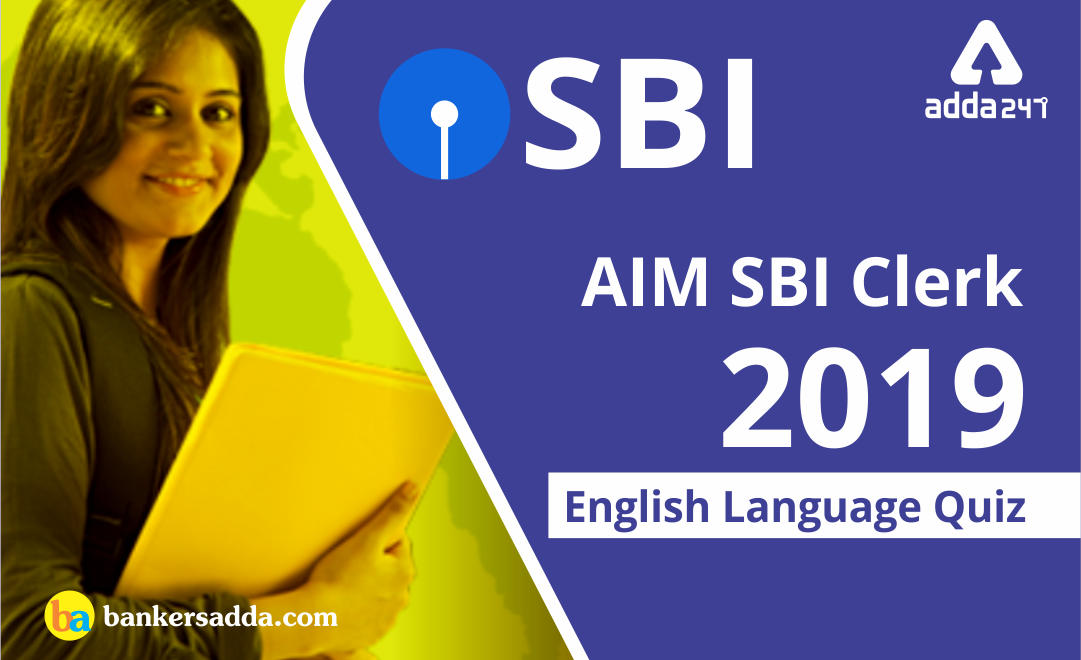SBI Clerk Prelims English Questions (Day-30)
Dear students, The State Bank of India conducts a two-tier examination to recruit Clerks (Junior Associates) at regular intervals. Thus, the English Language plays a crucial role in sailing through all the stages of SBI Clerk exam. Here is a quiz on the English Language to let you practice the latest pattern English Questions for SBI Clerk 2019-20.
Directions (01- 10): Read the following passage carefully and answer the questions given below it. Certain words are given in bold to help you locate them while answering some of the questions.
When we are children growing up, our imagination is the key to untold worlds. And it has been shown that kids with very active imaginations are more likely to dream and strive for greater things as adults. It is a sad fact that all too often, as we grow up, we are told to “get our heads out of the clouds”, to "stop daydreaming", and that living in an imaginary world is not good for us. But stifling your imagination is the worst thing you can do to yourself, as it will only pave the way for accelerated aging, and all too often a life that feels unfulfilled.
Though many take creativity for granted, it is a trait not possessed by everyone. Many people are labelled as primarily “right brained” or “left brained” (if such a thing exists): It is argued that highly intellectual, logical types are less likely to be creative, have less wild imaginations and are typically rule followers who do not believe in much of anything that cannot be logically quantified. Regardless of the left brain / right brain argument, imagination unleashes creativity, allowing you to live a life filled with potential. The creative individual does not see the sky as the limit, instead the limit is as far as he or she can imagine. They not only think outside the box, for them there is no box, and so their brains are constantly challenged, humming and conjuring up all sorts of goodies. Anything the mind can conjure is good enough to become true, be it work, life, personal goals accomplishments or anything. A very good trait to cultivate from childhood.
Empathy is the act of being truly sympathetic to another person, without ever actually experiencing what they are going through yourself. Sadly, many people do not know how to express empathy, and the reason for this is simple; it is not because that person is a bad individual, or mean spirited. It simply means that individual cannot imagine the feelings of the person experiencing a particular event, and thus cannot truly relate. Your imagination may leave you in a good position to offer a shoulder for comfort and support, as you are able to envision going through the same thing as the person suffering, and thus able to demonstrate what you think a person needs at that time. Being of service towards other people in that way, promotes your own mental health and emotional well being.
Those brain connections are a part of what makes you who you are, and forming new connections supports memory functions and keeps the brain vibrant and strong. Your imagination can be a useful tool for strengthening these connections, in order to form long-term memories. Here are two explanations of how memory works; an intellectual will harness and strengthen memory by repetition. Studying work day after day enhances these connections bit by bit, or via physical practice. On the other hand, someone who uses their imagination may know something well, and be able to recall everything without seeming to make an effort. Take for example planning for their wedding. Years and years beforehand, that person could have meticulously planned and imagined their dream wedding, so that when the actual time comes, the planning step and what they want pops up like clockwork.
Those brain connections are a part of what makes you who you are, and forming new connections supports memory functions and keeps the brain vibrant and strong. Your imagination can be a useful tool for strengthening these connections, in order to form long-term memories. Here are two explanations of how memory works; an intellectual will harness and strengthen memory by repetition. Studying work day after day enhances these connections bit by bit, or via physical practice. On the other hand, someone who uses their imagination may know something well, and be able to recall everything without seeming to make an effort. Take for example planning for their wedding. Years and years beforehand, that person could have meticulously planned and imagined their dream wedding, so that when the actual time comes, the planning step and what they want pops up like clockwork.
Q1. What, according to the passage, is/are the disadvantage(s) of constraining the children to be realistic and not imaginative?
(I) it will lead to an unfulfilled life.
(II) They lack empathy
(III) It limits the growth of their brain.
Only (I)
Only (II)
Both (I) and (II)
Both (II) and (III)
All
Solution:
Refer the last few lines of first paragraph “But stifling your imagination is the worst thing you can do to yourself, as it will only pave the way for accelerated aging, and all too often a life that feels unfulfilled.” Hence option (c) is the correct choice.
Q2. “Imagination unleashes Creativity”. Justify.
They become sympathetic.
They (imaginative people) believe in things that can not be logically quantified.
They (imaginative people) set their own limit.
It protects us from day dreaming
All are correct
Solution:
Refer second paragraph of the passage “ The creative individual does not see the sky as the limit, instead the limit is as far as he or she can imagine. They not only think outside the box, for them there is no box, and so their brains are constantly challenged, humming and conjuring up all sorts of goodies”. Other options are incorrect and not true or definite.
Q3. According to the passage, how can a person express empathy?
by not being mean spirited
by visualising or imagining the same suffering as others.
By giving some time to them.
Both (a) and (b)
All are correct
Solution:
Refer the third paragraph of the passage “our imagination may leave you in a good position to offer a shoulder for comfort and support, as you are able to envision going through the same thing as the person suffering.” Hence option (b) is the correct choice.
Q4. Which of the following is an appropriate title of the passage?
Harmful effects of stiflings the imagination
The power of using your imagination
Expressing empathy
Imagination and creativity
Imagining beyond the limit of the sky.
Solution:
“ The power of using your imagination” is an appropriate title of the passage as the passage revolves around the theme of advantages of being imaginative.
Q5. According to the passage, Imaginative power helps in
thinking creative and original
strengthening connections
becoming an empathetic person.
Fulfill their potential
All
Solution:
The passage is about about using imagination for different purposes. All the given options are mentioned in the passage. Hence option (e) is the right choice.
Q6. How imagination can be a useful tool in strengthening the brain connections?
By using various means of imagination to communicate for strengthening the connections.
As it helps us to interact day after day which can help them in strengthening the connections.
As it becomes easier to recollect.
Both (a) and (c)
All are correct
Solution:
Refer the last paragraph of the passage “On the other hand, someone who uses their imagination may know something well, and be able to recall everything without seeming to make an effort.” Recollect means to remember and is similar in meaning to recall. Hence option (c) is the correct choice.
Q7. Choose the word/group of words which is most SIMILAR in meaning to the word/group of words printed in bold as used in passage.
Conjure
fatuous
adjure
abstruse
dogmatic
abject
Solution:
Conjure means implore (someone) to do
something. Hence it has same meaning as adjure.
something. Hence it has same meaning as adjure.
Abject means of the most contemptible
kind.
kind.
Abstruse means difficult to penetrate.
Dogmatic means pertaining to a code of
beliefs accepted as authoritative.
beliefs accepted as authoritative.
Q8. Choose the word/group of words which is most SIMILAR in meaning to the word/group of words printed in bold as used in passage.
Quantified
extraneous
incumbent
appraise
Inchoate
Expiate
Solution:
Quantified means express or measure the
quantity of. Hence it has same meaning as appraise.
quantity of. Hence it has same meaning as appraise.
Extraneous means not belonging to that
in which it is contained.
in which it is contained.
Expiate means make amends for.
Incumbent means necessary as a duty or
responsibility, morally binding.
responsibility, morally binding.
Q9. Choose the word/group of words which is most OPPOSITE in meaning to the word/group of words printed in bold as used in passage.
Meticulously
onerous
obfuscate
noxious
imprecise
negligent
Solution:
Meticulous means in a way that shows
great attention to detail, very thoroughly. Hence it has opposite meaning as
imprecise.
great attention to detail, very thoroughly. Hence it has opposite meaning as
imprecise.
Noxious means injurious to physical or
mental health.
mental health.
Obfuscate means make obscure or unclear.
Q10. Choose the word/group of words which is most OPPOSITE in meaning to the word/group of words printed in bold as used in passage.
Envision
pithy
scurrilous
requisition
pernicious
disregard
Solution:
Envision means imagine as a future
possibility, visualize.. Hence it has opposite meaning as disregard.
possibility, visualize.. Hence it has opposite meaning as disregard.
Pernicious means exceedingly harmful.
Pithy means concise and full of meaning.
Pithy means concise and full of meaning.
Requisition means an authoritative
request or demand.
request or demand.
Directions (11-15): Read each sentence to find out whether there is any grammatical or idiomatic error in it. The error, if any, will be in one part of the sentence. The number of that part is the answer. If there is ‘No error’, the answer is (e). (Ignore errors of punctuation, if any.)
Q11. As soon as we (A)/enter the hotel the (B)/Manager welcomes us and (C)/took us to the table. (D)/No Error (E)
A
B
C
D
E
Solution:
‘takes’ will be used in place of ‘took’ as the sentence is in present tense.
Q12. In spite of our several request (A)/ the owner of the house (B)/did not open (C)/the door of his house. (D)/No Error (E)
A
B
C
D
E
Solution:
‘requests’ will be used in place of ‘request’ because ‘several, many, various, few, a few, very few’ tells the number hence nouns after them is used as plural.
Q13. The manager concluded that(A)/either Mahesh (B)/or Teja were (C)/responsible for the last week’s theft. (D)/No Error (E)
A
B
C
D
E
Solution:
was’ will be used in place of ‘were’ as if ‘either…or, neither…nor, not only…but also’ is connected with two singular nouns then the verb which is used is singular.
Ex. Either Sita and Mira was guilty.
Neither john nor Tom is late.
Q14. I have told suresh (A)/that it will not be possible (B)/for me to carry on (C)/this kind of work. (D)/ No error. (E)
A
B
C
D
E
Solution:
The sentence is grammatically correct.
Q15. In today meeting (A)/we must first discuss (B)/and thrash out the problem (C)/one by one. (D)/No error (E)
A
B
C
D
E
Solution:
‘In today’s meeting’ will be used in place of ‘In today meeting’.




 English Language Quiz For Bank Foundatio...
English Language Quiz For Bank Foundatio...
 English Language Quiz For SBI Clerk Prel...
English Language Quiz For SBI Clerk Prel...
 English Language Quiz For SBI Clerk Prel...
English Language Quiz For SBI Clerk Prel...



